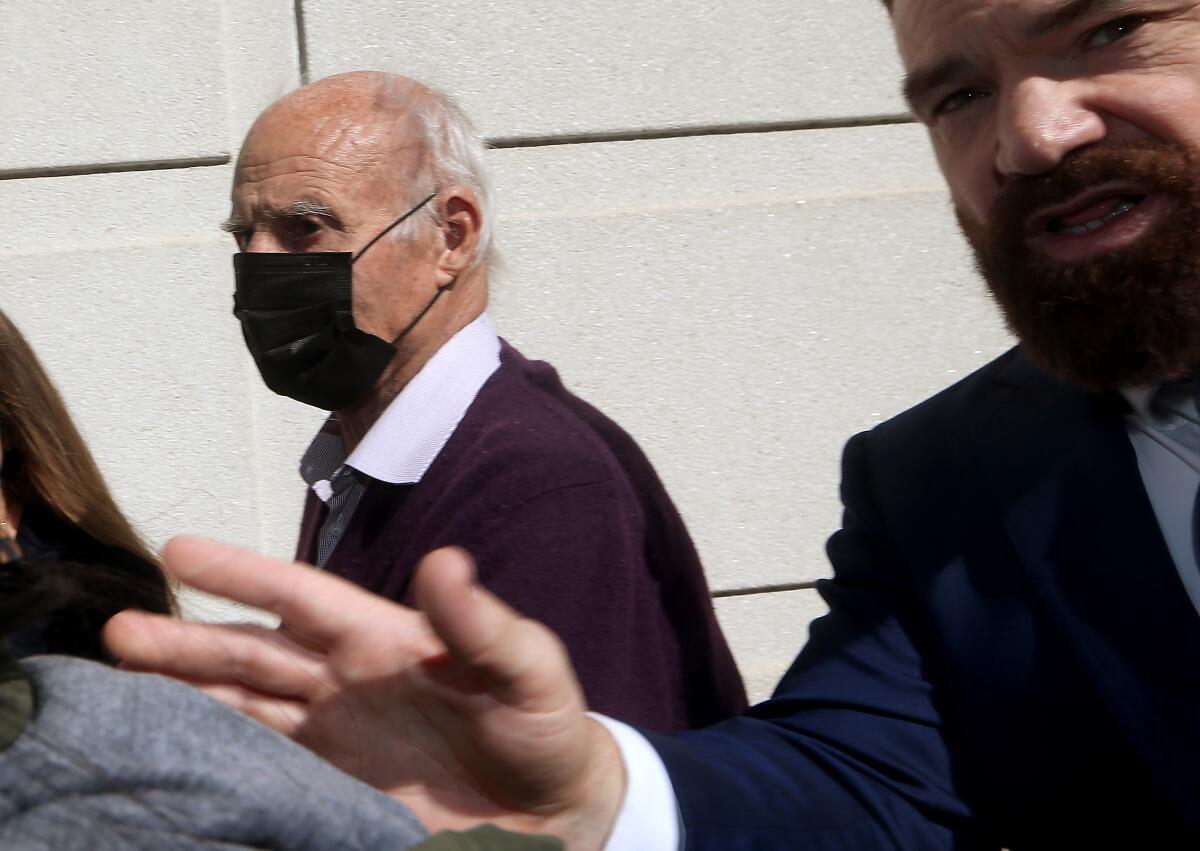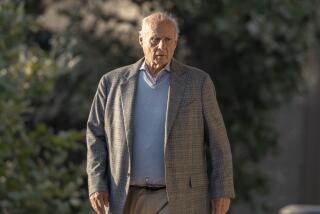Tom Girardi curses at prosecutor as judge weighs the ex-attorney’s competency to stand trial

- Share via
The third day of Tom Girardi’s competency hearing was well underway Wednesday morning when the once-formidable trial attorney muttered an insult to the federal prosecutor leading the criminal case against him.
“Your honor, I want the record to make clear that the defendant said ‘f— you’ to me,” Assistant U.S. Atty. Ali Moghaddas told U.S. District Judge Josephine L. Staton.
The remark was not audible among those present in the courtroom gallery, but Girardi’s defense attorneys, seated beside him, did not dispute the prosecutor’s account.
The insult came as Moghaddas was cross-examining Stacey Wood, a forensic neuropsychologist who has opined that Girardi is not competent to stand trial.
Moghaddas incorporated the disruption into his questioning, asking Wood what the comment showed about Girardi’s present-day capacity.
“It’s certainly rude and inappropriate,” Wood told the prosecutor. “You deserve our respect.”
The competency hearings concluded Wednesday afternoon after nearly a dozen witnesses offered their views on Girardi’s current mental state. Staton, the judge, indicated it would be months before she issued a ruling on his fitness to stand trial.
Girardi is under federal indictment in two jurisdictions — L.A. and Chicago — for allegedly embezzling $18 million from clients in what prosecutors have described as a decades-long Ponzi scheme involving settlement money. They allege he used money due to vulnerable people he represented to cover his law firm’s payroll and personal expenses, including a hefty American Express bill and fees at two country clubs.
Girardi was initially diagnosed with Alzheimer’s disease in 2021 in connection with conservatorship proceedings and now resides in the locked memory ward of an Orange County nursing home. He was disbarred last year.
His attorneys maintain he has profound memory problems, making him unable to assist in his own defense and incompetent to go before a jury. Prosecutors insist he is able to stand trial.
One of his physicians, Dr. Helena Chui, testified that despite the initial diagnosis, she no longer believes Girardi has Alzheimer’s. Chui said that he instead has limbic-predominant age-related TDP-43 encephalopathy, or LATE, a type of dementia that is now moderately severe.
On Wednesday, a parade of Girardi’s former employees and close friends testified to Girardi’s decline, often in graphic detail about his inability to care for himself.
Amber Ringler, his travel agent, party planner and close friend of about two decades, traced his mental decline to around 2015, when he expressed difficulty remembering the names of attorneys who worked for him.
“He’d repeat a number of times the same stories, over and over, within a matter of minutes,” Ringler said. She said rumors of his memory deteriorating became rampant at the law firm from 2015 to 2017. She recalled hearing from Robert Finnerty, a senior lawyer at the firm, who told her, “Tom is suffering. He’s suffering from dementia.”
Ringler described efforts to have Girardi informally evaluated for memory issues. She said she once texted and called Girardi’s personal physician, saying the then-lawyer needed to have an MRI done.
Since the collapse of his law firm in late 2020, Ringler and others said, Girardi’s condition had continued to worsen.
“I know him. He’s not faking,” Ringler said on the witness stand.
Under cross-examination, Ringler acknowledged she had made a lot of money from her relationship with Girardi, given the events and trips she planned. And asked whether she was Girardi’s girlfriend, she denied it. Assistant U.S. Atty. Scott Paetty asked Ringler whether she was aware that Girardi had told his doctor that he was in a romantic relationship with her. She did not know that, but she said she wasn’t surprised.
“I’m not his girlfriend,” she said. “He’s one of my best friends, if not my best friend.”
Isabel Mancilla, who started working as Girardi’s housekeeper in 1998, described how she often saw Girardi for years in the 10 minutes before he headed off to work, dressed cleanly and well groomed. After a car accident in 2017, she said, Girardi started wearing the same socks three days in a row or collecting old foam coffee cups.
In late 2020 and early 2021, his health worsened. Mancilla said that as the law firm collapsed, household employees stopped working, but that she stayed on, working for free. With few others in his life, she said, she cooked for Girardi, cleaned for him, accompanied him to doctor’s appointments and ensured he took his medication.
Mancilla said she’d tell Girardi, “Mr. Tom, you have an appointment tomorrow.” He would reply, “With who, honey?” She would explain his appointment, but one or two hours later, he’d forget.
“He never remembered,” she said. Most days, she said, he would claim to be working on a notepad with papers spread on the table; she knew his law firm had shut down. And Girardi increasingly was unable to care for himself hygienically, wearing the same pair of pants for days, even after soiling his clothes.
Mancilla said that she had to start hiding his car keys and that he often did not know where he was. One time, he left a medical appointment out a different exit, and Mancilla had to track him down as he had walked about two miles toward his house.
Wood, the forensic neuropsychologist retained by the defense, explained the basis for her opinion that Girardi is not competent to stand trial.
“It’s very difficult for him to learn information and retain it over time,” she said, adding that Girardi would be unable to, or impaired in, effectively assisting his attorneys or making key decisions, such as entering a guilty plea.
“Despite meeting multiple times, it was difficult for Mr. Girardi to maintain information about the case,” Wood said. He also showed deficits in memory consistent with dementia.
“Did Mr. Girardi have difficulty remembering his children’s names?” asked Harbaugh, of the federal public defender’s office.
“He remembered his son but not his daughters’ names,” Wood replied. “That’s not that unusual among elderly patients with dementia.”
Wood described multiple meetings with Girardi and said that he can appear to maintain a conversation for 15 minutes or so, but beyond that, cannot follow an exchange. After an initial meeting at which Wood went over the criminal case against him, she said, a week passed before their next meeting.
“He did not have any recollection. We were back to square one,” Wood said of their next meeting.
On cross-examination, the prosecutor, Moghaddas, asked why Wood hadn’t sought to interview Girardi’s wife, Erika, whom he described as “quite arguably the one person with the most contact with the defendant in the last 20 years.”
“Usually it‘s helpful” to question a spouse, Wood acknowledged, but she said she had concerns that both Girardis stood accused of wrongdoing, an apparent reference to lawsuits that have accused Erika Girardi of knowing of her husband’s alleged thievery.
“I just thought there could be a conflict of interest,” she said, noting that a prosecution expert also did not talk to Girardi’s estranged wife.
Girardi said he did not remember his third wife in interviews with Wood and other experts. Moghaddas asked whether it was typical for someone with mild dementia to forget entirely a spouse of two decades.
“I did find that to be,” Wood said, then finishing after a long pause, “unusual.”
The judge has heard testimony that Girardi speaks to his wife every day by phone and has made statements indicating he is keeping abreast of developments in her life. Prosecutors on Wednesday played a snippet of a podcast, “Two Ts in a Pod,” recorded this month, in which Erika Girardi indicated to former “Real Housewives” castmates Teddi Mellencamp and Tamra Judge that her husband was aware of a Las Vegas residency she launched recently.
“He called me this morning to ask me how my show was,” Erika Girardi told them.
Moghaddas suggested Girardi was deceiving Wood and other experts and noted that he had a long career of making persuasive arguments to judges and juries.
“This is the most important case in Tom Girardi’s life,” he said.
After years living in an assisted living facility, Girardi seemed overcome at being face-to-face with friends and associates he had known for decades. With the housekeeper, Mancilla, he stood up after her testimony, clasping a folded piece of paper, and moved toward her, as if trying to hand her a note. His lawyers blocked him from leaving his seat.
When Girardi saw Ringler seated on a bench as he returned to the courtroom after lunch, he became excited and tried to engage her in conversation.
One of his defense attorneys, Deputy Federal Public Defender Alejandro Barrientos, intervened, guiding him toward the courtroom. Girardi responded by calling his lawyer a profanity, saying, “You think I’ve never been in court before.”
More to Read
Sign up for Essential California
The most important California stories and recommendations in your inbox every morning.
You may occasionally receive promotional content from the Los Angeles Times.












